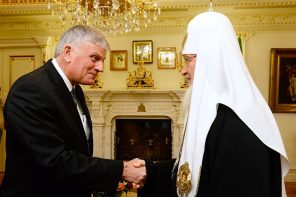The New York Times op-ed by Tony Campolo and Shane Claiborne was bound to appear sooner or later. Before Trump’s victory had even fully registered, one of the editors of this magazine predicted that the keepers of the evangelical flame would quickly try to disassociate the brand from the tidal wave of white evangelical votes given to a candidate whose lifetime credo has been to “do to others before they do to you.”
Campolo and Claiborne point out that evangelicalism is a big tent, not simply a white man’s club. But they go on to say that the whole evangelical enterprise is now so discredited that radical action is called for. That action: find a new name for America’s Jesus followers. The writers then urge this rebranded remnant to take Jesus’ core teachings a bit more seriously.
Where to begin?
I will list just a few obvious problems with the Campolo/Claiborne analysis and proposal. I invite RD leaders to add to the list.
1. White male leadership will persist, if only for the obvious reason that white men dominate evangelical pulpits and white men also continue to control the evangelical organizations that have real money.
2. Yes, it’s true that Rev. William Barber II has claimed the evangelical mantle as he struggles against voter suppression and plantation capitalism, but Campolo and Claiborne willfully ignore the way in which Barber deliberately separates what he means by evangelical witness from what 99% of the evangelical tribe believe that witness to be. (See RD’s extended treatment of Rev. Barber’s book and the Moral Mondays Movement.)
3. Campolo and Claiborne ignore the much deeper problem with American evangelicalism, which lies is its uncritical embrace of the gospel of individual ambition and individual salvation. This embrace naturally entails acceptance of the sanctity of private property and corporate rule. “Me and Jesus” theology coupled with an functional ethic of acquisitive individualism yields a very strong made-in-hell fusion that won’t soon be dissolved. The form of devotion that Chris Lehmann aptly calls the “money cult” has never been stronger among U.S. Christians who identify as evangelical.
There certainly was a time when leading evangelicals railed against money grubbing and corporate domination (e.g., William Jennings Bryan), but that time is long past. There is, in fact, so much prosperity preaching in today’s evangelical churches that it’s hard to imagine persons whose sense of God’s will and God’s ways has been so thoroughly deformed in these churches to even be able to hear the underlying jubilee message animating both testaments. In short, you can print the attested sayings of Jesus in as much red ink as you want, but Bible readers who have been colonized by a false free market gospel will never attend to what Jesus called the “weightier matters of the law.”
4. The “one way” theology shared by almost all evangelicals, not just the old white men, comprises a permanent stumbling block in a multicultural society and an increasingly multi-faith environment. People who seriously believe that non-Christians are “less than” in God’s eyes will necessarily be regarded as untrustworthy partners in the common struggle for a just society.
5. Campolo and Claiborne even get their history wrong. What they regard as the first successful re-branding of Bible-centered “orthodox” American Christianity in the early 20th century was in fact a complete failure, just as their proposed “Red Letter” re-branding will be this era.
They cite Carl F.H. Henry as the principal re-brander in the 1930s, but Carl Henry was not really a force to be reckoned with prior to the 1940s and 1950s. Moreover, Carl Henry’s beliefs were immediately understood to be contaminated by the same poisons that had fatally tainted Fundamentalism: i.e., a rigid view of biblical inerrancy (including a literalist view of the miracle stories), insistence that mere individual conversion fulfills God’s will, complete acceptance of the old patriarchal frame, etc.
It would be hard to find any daylight at all between the theological commitments of Carl Henry and those of J. Gresham Machen, who was heralded during the 1930s as the single brightest light among the Fundamentalists.





